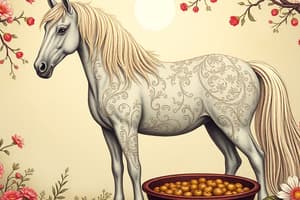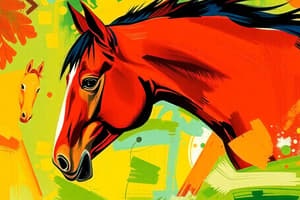Podcast
Questions and Answers
What is a common sign of protein deficiency in horses?
What is a common sign of protein deficiency in horses?
- Poor quality haircoat (correct)
- Increased appetite
- Enhanced muscle growth
- Improved hoof growth
Which mineral deficiency is most likely to occur in horses fed poor-quality grass hay without grain?
Which mineral deficiency is most likely to occur in horses fed poor-quality grass hay without grain?
- Magnesium
- Phosphorus (correct)
- Calcium
- Iron
What symptom is associated with salt (NaCl) deficiency in horses working hard in hot weather?
What symptom is associated with salt (NaCl) deficiency in horses working hard in hot weather?
- Fatigue and stopping to sweat (correct)
- Hyperactivity
- Increased sweating
- Decreased muscle spasms
Which condition can result from a chronic deficiency of potassium in horses?
Which condition can result from a chronic deficiency of potassium in horses?
What laboratory finding may indicate phosphorus deficiency in horses?
What laboratory finding may indicate phosphorus deficiency in horses?
What behavior may horses exhibit before showing obvious clinical signs of phosphorus deficiency?
What behavior may horses exhibit before showing obvious clinical signs of phosphorus deficiency?
What can occur in lactating mares due to chronic salt deficiency?
What can occur in lactating mares due to chronic salt deficiency?
Which deficiency is most commonly observed in horses whose diet primarily consists of rich forages?
Which deficiency is most commonly observed in horses whose diet primarily consists of rich forages?
Which nutrient deficiency is most likely to result in weight loss in horses?
Which nutrient deficiency is most likely to result in weight loss in horses?
What is a common response to energy excess in adult horses?
What is a common response to energy excess in adult horses?
Which nutrient deficiency can greatly affect a young horse's skeletal growth?
Which nutrient deficiency can greatly affect a young horse's skeletal growth?
What is the least affected organ in horses during periods of caloric deficiency?
What is the least affected organ in horses during periods of caloric deficiency?
What can overfeeding good quality hay lead to in sedentary horses?
What can overfeeding good quality hay lead to in sedentary horses?
When considering nutrient toxicity in horses, which nutrient is commonly found in excess?
When considering nutrient toxicity in horses, which nutrient is commonly found in excess?
What is an early sign of caloric deficiency as seen in horses?
What is an early sign of caloric deficiency as seen in horses?
What metabolic disorder is associated with obesity in horses and suspected insulin resistance?
What metabolic disorder is associated with obesity in horses and suspected insulin resistance?
What symptoms are indicative of a selenium deficiency in horses?
What symptoms are indicative of a selenium deficiency in horses?
What dietary condition can lead to signs of vitamin A deficiency?
What dietary condition can lead to signs of vitamin A deficiency?
Which vitamin is especially vulnerable to loss during storage in feed?
Which vitamin is especially vulnerable to loss during storage in feed?
What condition might result from a vitamin D deficiency in horses?
What condition might result from a vitamin D deficiency in horses?
Which of the following is NOT a sign of vitamin A deficiency?
Which of the following is NOT a sign of vitamin A deficiency?
What might be a potential consequence of prolonged aggressive antibiotic treatments?
What might be a potential consequence of prolonged aggressive antibiotic treatments?
What process may be affected by a vitamin A deficiency in the intestinal mucosa?
What process may be affected by a vitamin A deficiency in the intestinal mucosa?
What clinical sign could indicate a selenium excess in horses?
What clinical sign could indicate a selenium excess in horses?
What sign is NOT associated with experimental thiamine deficiency?
What sign is NOT associated with experimental thiamine deficiency?
Which condition is directly related to nutritional deficiencies in horses?
Which condition is directly related to nutritional deficiencies in horses?
Excess zinc in young horses can lead to which of the following issues?
Excess zinc in young horses can lead to which of the following issues?
Which disease is classified as indirectly related to nutrition?
Which disease is classified as indirectly related to nutrition?
A horse with alopecia and cutaneous lesions may be suffering from which nutritional deficiency?
A horse with alopecia and cutaneous lesions may be suffering from which nutritional deficiency?
Which nutritional issue is recognized for affecting both performance and health in horses?
Which nutritional issue is recognized for affecting both performance and health in horses?
Which statement about equine nutritional diseases is incorrect?
Which statement about equine nutritional diseases is incorrect?
Increased needs for thiamine may result from which of the following factors?
Increased needs for thiamine may result from which of the following factors?
What condition may be induced by excess potassium intake?
What condition may be induced by excess potassium intake?
What is a common consequence of magnesium deficiency in foals?
What is a common consequence of magnesium deficiency in foals?
What is the most reliable method to determine the iron status of a horse?
What is the most reliable method to determine the iron status of a horse?
Which of the following symptoms is not associated with zinc deficiency in foals?
Which of the following symptoms is not associated with zinc deficiency in foals?
What condition can result from iron excess in horses?
What condition can result from iron excess in horses?
What potential outcome is associated with low copper concentrations in aged mares?
What potential outcome is associated with low copper concentrations in aged mares?
What excess level of zinc has been linked to developmental orthopedic disease in young horses?
What excess level of zinc has been linked to developmental orthopedic disease in young horses?
Which of the following conditions is least likely to be caused by magnesium deficiency?
Which of the following conditions is least likely to be caused by magnesium deficiency?
Flashcards are hidden until you start studying
Study Notes
Nutritional Deficiencies in Horses
- Nutrient deficiencies in horses are rare but can include caloric intake, protein, calcium, phosphorus, copper, sodium chloride, and selenium.
- Symptoms of deficiencies are often nonspecific and may involve multiple nutrient deficiencies simultaneously.
- Nutrients like energy, phosphorus, iron, copper, selenium, and vitamin A are frequently found in excess, leading to toxicity and metabolic disorders.
Energy Deficiency
- Cardinal sign of caloric deficiency is weight loss; other signs are nonspecific.
- Partial or complete starvation can lead to internal organ atrophy, particularly affecting growth, reproduction, and performance.
- Young horses' skeletons are very sensitive, potentially halting growth.
- Decreased adipose tissue in areas such as mesentery and retroperitoneum shows chronic energy deficiency.
Energy Excess
- Overfeeding high-calorie feeds can cause obesity in adult horses and developmental orthopedic diseases in growing horses.
- Obese horses, even on good quality hay, risk laminitis and colic.
Protein Deficiency
- Insufficient dietary protein may arise from inadequate intake or lack of essential amino acids.
- Common signs include poor haircoat, weight loss, decreased milk production in lactating mares, and stunted growth in foals.
Mineral Deficiencies and Excesses
- Phosphorus Deficiency: Common in horses fed poor-quality hay; symptoms may include shifting lameness and increased alkaline phosphatase activity.
- Salt Deficiency: Occurs in hard-working horses in hot weather; may lead to muscle spasms, tiredness, and reduced milk production in lactating mares.
- Potassium Deficiency: Often from sweat loss, may cause muscle tremors and cardiac arrhythmias; most forages usually provide enough potassium.
- Magnesium: Deficiency in foals can lead to severe symptoms, but feeds typically contain adequate magnesium.
- Iron: Deficiency linked to parasitism; excess can cause anemia and affect copper metabolism.
- Zinc: Deficiency leads to slow growth and alopecia in foals, while excess can contribute to orthopedic issues.
- Copper: Linked to aortic issues in foals; excess may interfere with selenium and iron metabolism.
- Selenium: Deficiency manifests as white muscle disease; excess causes hair loss and hoof issues.
Vitamin Deficiencies
- Vitamin A: Deficiency leads to severe ocular and immune issues, skeletal deformities, and compromised reproduction.
- Vitamin E: Important antioxidant; deficiency relates to increased rhabdomyolysis and immune failure.
- Vitamin D: Limited sun exposure can lead to decreased bone health; supplementation can reverse signs.
- Thiamine: Deficiency can lead to anorexia and incoordination; stress may increase needs.
Equine Nutritional Diseases
- Nutritional diseases can impact overall health and performance; can be categorized as directly, indirectly, or a combination related to nutrition.
- Directly Related: Obesity, White Muscle Disease, Developmental Orthopedic Disease, Mycotoxicosis, Nutritional Secondary Hyperparathyroidism.
- Indirectly Related: HYPP, Insulin Resistance, Enterolithiasis, Polysaccharide Storage Myopathy.
- Combination of Both: Laminitis, Equine Colic, Equine Gastric Ulcer Syndrome.
Studying That Suits You
Use AI to generate personalized quizzes and flashcards to suit your learning preferences.




